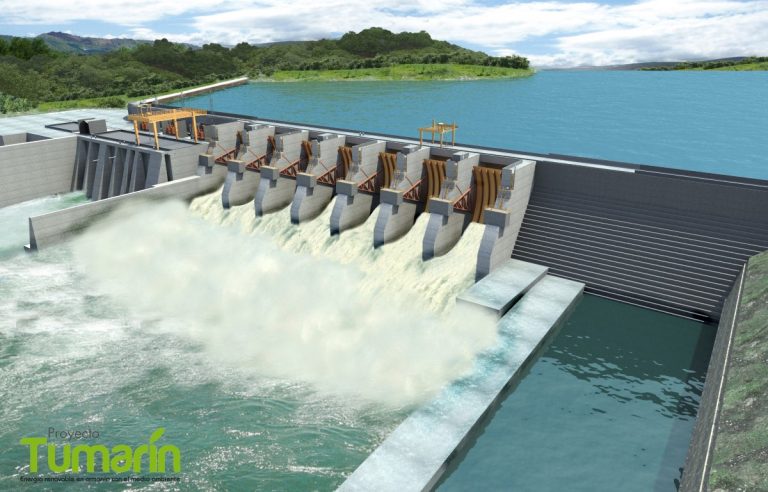4 de junio 2016

The Return of the Military

PUBLICIDAD 1M
PUBLICIDAD 4D
PUBLICIDAD 5D
Federal authorities investigate corruption allegations at Queiroz Galbao Group and Electrobras, which own 90% of Tumarin.

Enterprise level Tumarín. Archive / Confidencial
HAVANA TIMES — Brazil’s federal budget watchdog, the Federal Court of Accounts of Brazil (TCU) has decided to suspend new funding to State-controlled Electrobras for constructing the Tumarin hydropower plant in Nicaragua, after having discovered a number of “irregularities” in the process.
Although construction work had already been paralyzed due to a lack of funding, the measure will inevitably reduce the implementation rate of the contracts. According to Bruno Dantas, a TCU member, “the losses suffered because of a delay to construction will not exceed the damage that might be done without new funding, worth US $100 million.
In mid-May, the new Finance Minister, Henrique Meirelle, announced that the government would look into the possibility of providing new capital to Electrobras, which has been fighting a recession over the last two years as well as political problems which led it to losing cash money. The company is also involved in a corruption scandal that affects other State-owned enterprises.
Meirelles made this announcement after the company’s shares - also listed on the New York Stock Exchange - dropped 15% in three days; falling to 11.2 Brazilian Reals (BRL) per share (the highest they’ve stood at over the last year is at 13.75 BRL). It also came after a negotiation process of these shares in the US was suspended due to a delay in presenting Electrobras’ financial information, which they claimed was because of “accounting problems”.
Since then, company shares have slowly gone up on the Sao Paulo Stock Market and were listed at 12.98 BRL per share last Wednesday afternoon, after they rose 0.48 BRL (3.8%), during the day. (1 USD = 3.53 BRL)
Echoes of Operation ‘Lava Jato’
Corruption accusations stem from Brazil’s Federal Police who continue to investigate the case known as Operation “Lavo Jato”, which also includes the Queiroz Galvao Group, which is privately owned, as well as the State’s Electrobras, which has been given 15 days to answer the allegations made against them.
Electrobras and Queiroz Galvao hold equal shares of the 90% interest in the Centrales Hidroelectricas de Nicaragua (CHN) consortium which received a license to develop and implement the Tumarin hydropower project. The Nicaraguan state holds the remaining 10%.
In the case of the Tumarin hydropower project, the Federal Court found an agreement made by CHN shareholders which handed over a disproportionate level of risk to Electrobras, benefitting Queiroz Galvao’s interests, which would mean a significant amount of economic damage to the State-controlled company.
Publicity and propaganda expenses were found outside of the corporate program, as well as contractual problems with other expenses. The fact that Electrobras’ management is incapable to mitigate risk within the project; tax evasion and the obstruction of access to information were noted during the inquiry.
The decision was made after district attorneys at the Public Ministry, along with those at TCU, warned the Brazilian State of the risks it was taking with Electrobras in the Tumarin hydropower construction project; likewise with the Inambari project in Peru.
According to audit rapporteur, Jose Mucius, the audit’s findings are based on “the risk that similar irregularities to those identified by the Federal Police will eventually reach companies, as well as the possibility that if contractors go through a rough spot financially this will lead to great losses for the State.”
The investigation is yet another blow to the project and its development, especially after Queiroz Galvao already announced in April that they would leave Nicaragua for economic reasons. This came after there had been several delays to starting construction work, as that the plant should have already been generating electricity for 3 or 4 years by now.
Archivado como:
PUBLICIDAD 3M
Periodista nicaragüense, exiliado en Costa Rica. Durante más de veinte años se ha desempeñado en CONFIDENCIAL como periodista de Economía. Antes trabajó en el semanario La Crónica, el diario La Prensa y El Nuevo Diario. Además, ha publicado en el Diario de Hoy, de El Salvador. Ha ganado en dos ocasiones el Premio a la Excelencia en Periodismo Pedro Joaquín Chamorro Cardenal, en Nicaragua.
PUBLICIDAD 3D